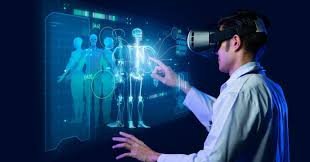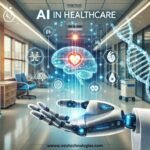Currently, the healthcare industry is experiencing a process of forward change due to the integration of artificial intelligence (AI) into medical practice. Though it gives unprecedented productivity AI is integral for human doctors, who possess instinct, understanding, and background. They are two young scientists who are greatly destined to revolutionize the present-day system and practice of medicine. This article will focus on integrating AI vs human doctors as the author seeks to make a case that integrating both will lead to better results in healthcare services provision.
AI application in Human Diagnostics and data analysis
Process of Data Analysis with the Help of AI

It also is the best when it comes to dealing with large amounts of data in the shortest time possible. Big data interpretative tools and analysis search for relationships and affiliations in electronic health records, diagnostic tests, and imaging data.
Medical Imaging: Radiology software for example is an artificial intelligence tool that identifies disparities on x-ray, CT scans, and MRI with such elegance and efficiency.
Predictive Analytics: To date, AI predicts future health risks and allows for action to prevent it.
Reducing Diagnostic Errors
The degree of risk of misdiagnosis is significantly reduced through the comparison of AI vs human in as numerous cases as possible by the use of AI. For instance, the existing AI systems have been used to detect unusual diseases, which might not be noticeable by experienced clinicians.
Human Doctors and the Art of Medicine
Empathy and Communication
As AI vs Human doctors for human doctors’ weakness, one sees that they possess a weak ability to build up rapport. No human emotion to comfort, inform about the condition, or to put things in right prospective and dispel the worries that an individual has – something which an AI can’t.
Building Trust: This is because patients expect doctors to therefore focus as well as address details of their lives and possibly short comings’ details.
Tailored Advice: They thus are inclined to provide advice for one firm based on such factors as feeling and psychological profiles.
Clinical Judgment
The fact of the matter is AI vs Human doctors that in virtually all or in each contingent or equivocal situation that presents itself in practice most doctors have no alternative but to rely on their intuition and practical experience. Indeed skill to receptacle new material and creativity to cogitate becomes a priceless asset in the sphere of health care.
Collaborative Workplace: A Surgery Perspective
AI-Assisted Surgeries
Some of the robotic surgical systems are computer assisted robotic surgical instruments, some of which include the da vinci surgical system that offer enhanced Virginia accuracy and does away with hand tremor in surgical procedures. These tools provide:
Enhanced Visualization: Especially for the surgeons, the real-time information superimPositioning functions are useful.
Steady Movements: AI gets rid of hand shakes that bring a lot of precision while conducting operations in the operating room.
The Surgeon’s Expertise
On the other hand, AI vs Human doctors AI deals strictly with the technical aspects of power analysis, identification of the best operation strategy and other details that may favor the operation, the performance of sensitive tasks which may include any form of contingency, and general health status of the patient.
Personalized Medicine: A Joint Effort
AI in Customizing Treatments
Thus, AI can identify diseases through the personal code genes, the behavior of the patient, and the family medical history. This is particularly effective in:
Cancer Therapies: This ability helps define the right set of drugs that can be effective depending on a patient’s genomics.
Chronic Disease Management: Some of the diseases algorithms address include diabetes and hypertension as well as offering lifestyle advice.
The Human Element in Treatment Plans
Human Component Considered in the Treatment Methods
Doctors interpret the result that was arrived by using AI solutions to understand what has been proposed and what must be done according to that result which has been arrived depending on patient’s choice and demographic profile.
AI in Preventive Healthcare
Monitoring and Alerts
AI precise wearable devices track the body and inform about the danger to health. Examples include:
Heart Rate Monitors: Experiencing any kind of arrhythmia that makes one feel as though the heart is about to be attacked.
Blood Sugar Monitors: Explaining to the diabetes patients the certain quantities at given time.
Behaviours Of Doctor: A Study Regulating Doctor’s Actions In The Area Of Preventive Medicine
AI derived data is incorporated in recommendations of a change in the lifestyle, prophylactic medication, and Occasionally Investigations.
Joining of Heads to Overcome Ethical Issues
AI’s Limitations
CI certainly is a great asset but it lacks in one major way, thus it is not human and cannot be human – no ethical sense, emotions, learning abilities: ad hoc. Physicians still remain the agents of moral decisions and The role of an ethical middleman, ensuring that autonomous decisions correspond to proper patient’s values.
Data Privacy: Doctors want protection of identifiable health information.
Bias in AI: The AI system makes suggestions that are fair and impartial and physicians agree with these suggestions.
Building Patient Confidence
The information AI and doctors gather trusted and results have accumulated. This is why patients can be calm when it comes to the use of results whose decision was arrived at by the application because the AI is backed up by the doctors vision and emotion.
The Future of artificial intelligence and human beings in the medical field
Integrated Healthcare Systems
It is critically important to find the best way of implementing AI in medicine so that it is fully collaborative with the traditional systems. Automating mnemonics means that AI will process voluminous data while doctors will concentrate on handling patients and acting ethically.
Continuous Learning
It is also equally important to note that there is going to be a constant development that will be helpful to both AI and the human doctors.ilmektedir
Rapid advancement in the fields of AI and compound development is immersing doctors in boundless opportunities. AI is progressive with new data, and doctors improve their practices with the help of AI learning.
Conclusion
AI and human doctors are not rivals but have the understanding of being in a team work. Combined, both result to harmony of needful rigidity, human touch, and specialized competence that is transforming healthcare. This partnership means that patients will be diagnosed and treated to the best of the available medical standard and a humane approach.1.
FAQs
What is the role of AI in healthcare?
Answer: Our question of inquiry for this study was as follows: The healthcare sector is pretty large and is advancing at a faster pace; specifically, what is AI’s position in the sector?
Answer: It is used in diagnostic, risk evaluation, drug development, helping to provide proper and exact treatment method for a patient, robotic surgery.
2. Are real life doctors replaceable by artificial intelligence in the future?
Answer: Decision making through self-learning is beneficial in selecting treatments, but in no ways can it be a substitute for doctors. It may be designed for pushing through data driven operations and is definitely capable of pattern recognition but two very critical aspects that both doctors contribute to patient care involve emotions, creativity and the flexibility.
3. But how does this AI create value out of the operation Theatre?
Answer: AI improvement in surgery is accomplished through real time image guidance, useful in complicated movements, no muscle trembling. However, the powers and management of extraordinary circumstance remain in the hands of the surgeons.
4. Can we use AI in diagnosing diseases?
Answer: The chief benefit of applying Artificial Intelligence is the high level of reliability in diagnosing illnesses particularly concerning medical image analysis and pat pelaern recognition. However, there is always need for some measure of control by human experts especially when presenting results especially for such complex or other special cases.
5. And so, we come to the familiar – or perhaps not so familiar – question of whether there are ethically acceptable ways of employing AI in healthcare.
Answer: Some of the ethic considerations are: Privacy of data, bias of the algorithms, responsibility of decision making by AI and equality of the share of AI. As for these concerns, doctors belong to ethical gatekeepers..




Pingback: Revolutionary AI-Powered Diagnostics: Transforming Healthcare Accuracy and Patient Outcomes - glotarhub.com
Really impressive and engaging content
Really engaging and informative
Pingback: AI vs Human Doctors: How They Complement Each Other – GlotarLife